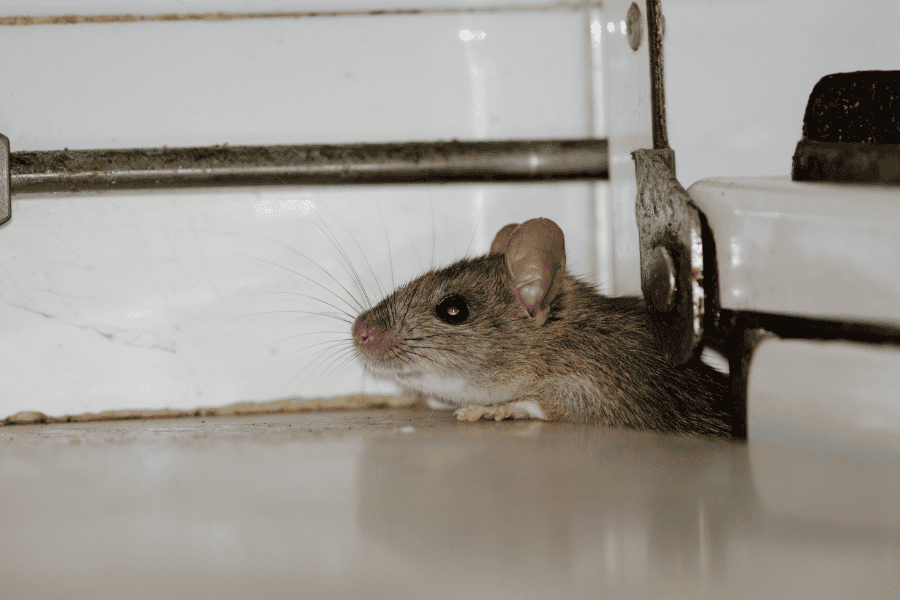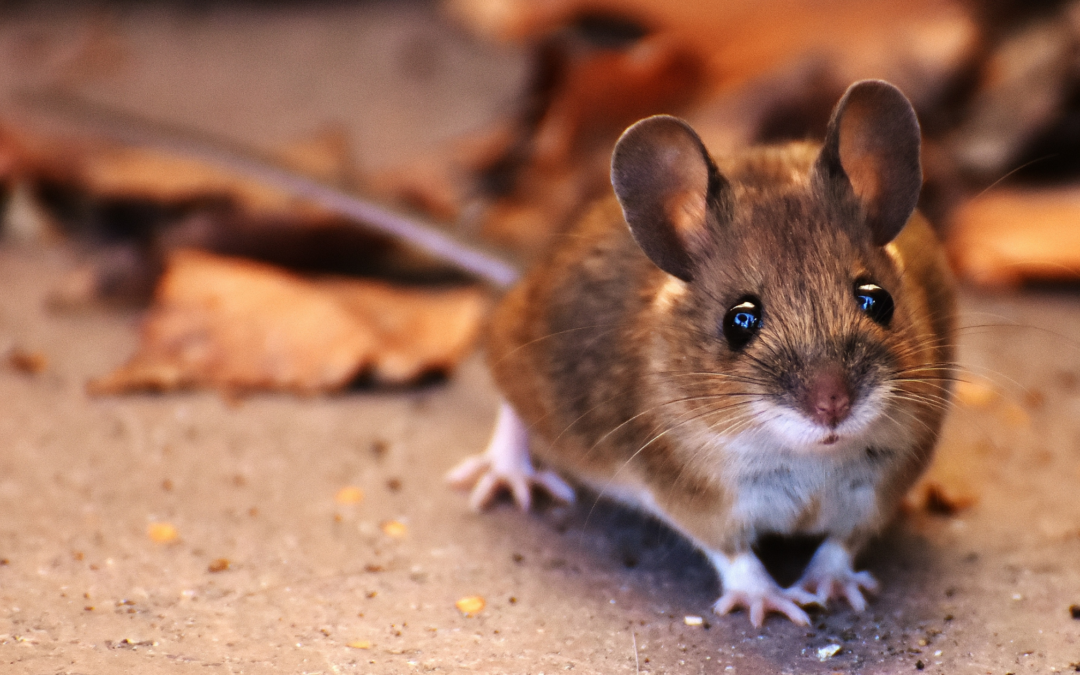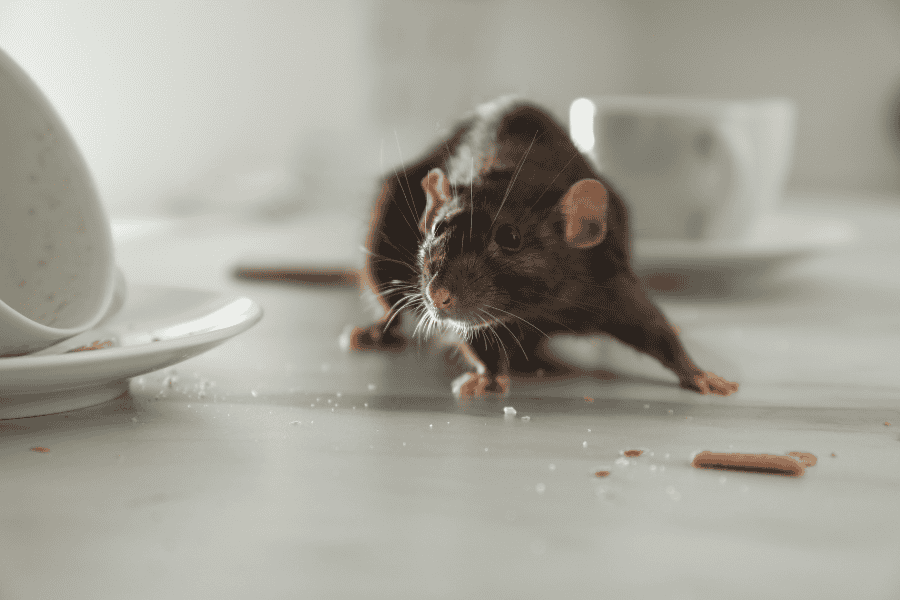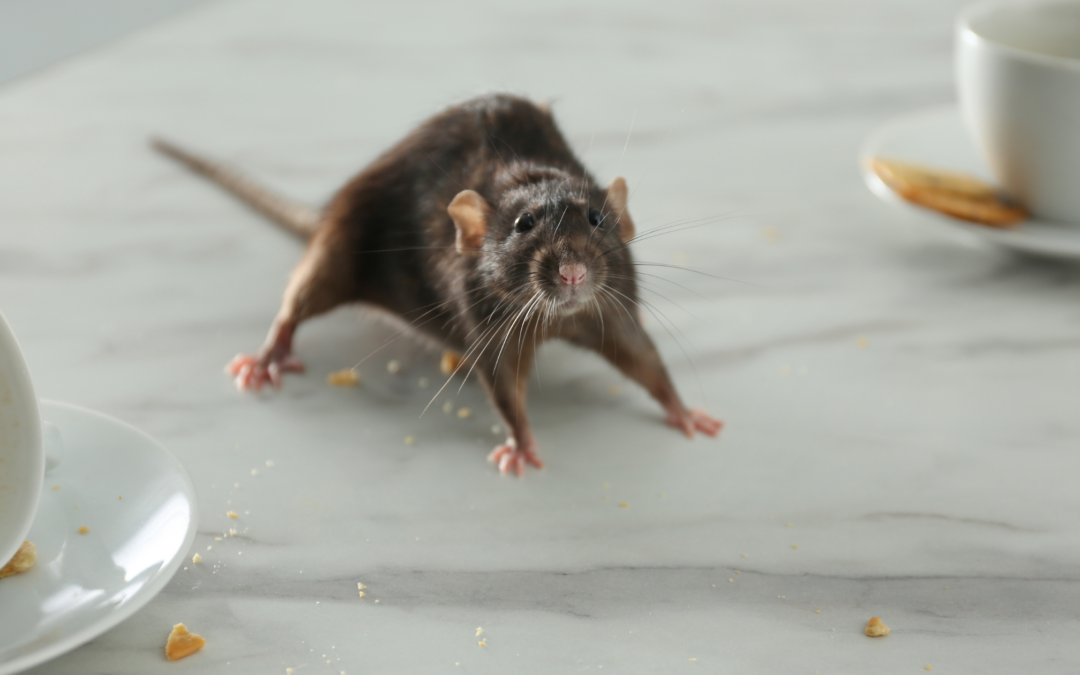READY TO GET STARTED?
REQUEST A FREE ESTIMATE
Fill out the form below or call (888) 466-7849 for a free, no-obligation estimate.

Rodents such as rats and mice are among the most common household pests in Georgia. They are notorious for invading homes, contaminating food, spreading diseases, and causing structural damage. Learning to identify the signs of rodents and taking proactive steps to prevent infestations can help protect your home and family. Below, we outline 12 practical rodent control tips, discuss the types of rodents common in Georgia, and explain why these pests invade homes.
Rodents enter homes searching for three basic needs: food, water, and shelter. Here’s why and how they manage to get inside:
Inspect your home for cracks, holes, and gaps, especially around doors, windows, and the foundation. Use steel wool, caulk, or hardware cloth to seal these openings, as rodents can gnaw through weaker materials.
Store all food, including pet food, in airtight containers. Clean up crumbs and spills promptly, and avoid leaving dirty dishes overnight.
Repair leaky faucets and pipes, and ensure your home’s drainage system works efficiently. Remove standing water both inside and outside your home.
Rodents love cluttered spaces where they can hide and nest. Keep storage areas tidy, dispose of unused items, and organize your garage or attic.
Vacuum floors, wipe down counters, and take out the trash daily. Rodents are less likely to settle in a home that’s free of food residue.
Gaps under doors are a common entry point for rodents. Installing door sweeps can prevent rats and mice from sneaking inside.
Traps are an effective do-it-yourself rodent control method for small infestations. Snap traps, glue traps, and live traps are widely available at hardware stores. Be sure to place traps near walls and areas with visible signs of rodents, such as gnaw marks or droppings.
Natural deterrents like peppermint oil, cayenne pepper, and ultrasonic devices can help repel rodents. However, these methods are often best used alongside more robust solutions.
Trim tree branches that touch your roof, as they serve as highways for roof rats. Remove piles of debris, and store firewood at least 20 feet from your home to eliminate potential nesting sites.
Stay vigilant for signs of rodents, including droppings, chewed wires, nests made of shredded materials, and unusual noises in walls or ceilings. Early detection is key to preventing a full-blown rodent infestation.
If you’re using traps or rodenticides, ensure they’re placed in areas inaccessible to children and pets. Many rodent control products can be hazardous if accidentally ingested.
For severe rodent problems, contacting a professional rodent exterminator or pest control company is the safest and most effective solution. These experts have the tools, experience, and knowledge to eliminate rodents and prevent future infestations. Consider pest control companies who specialize in green pest control methods to not only eliminate your pest issues but do so in a way that is safe for the environment, children, and pets.
Rodents are not just a nuisance; they pose serious health risks. They can spread diseases to humans and pets, including:
These diseases underscore the importance of addressing rodent problems promptly.
If you suspect an infestation, take the following steps immediately:
While do-it-yourself rodent control can be effective for minor infestations, professional pest control services offer significant advantages:
If you’re searching for “rodent control near me” in Georgia, consider reaching out to a trusted pest control company for a consultation.
Preventing a rodent infestation is always easier than eliminating one. Follow these tips, stay vigilant, and take action at the first sign of activity. Rodents may be small, but their ability to contaminate food, spread diseases, and damage property makes them a big threat.
Whether you need assistance with rat control, advice on how to get rid of rodents, or help with ongoing rodent problems, don’t hesitate to contact a professional pest control company. They can provide the expertise and peace of mind you deserve.
If you’re dealing with a rodent issue or want to take preventive measures, call a local pest control company today for a free consultation. Let the professionals handle the problem so you can enjoy a safe, rodent-free home.

Rodents are a common issue for homeowners in Georgia, particularly during certain times of the year. Understanding when these pests are most active, the risks they pose, how they infest homes, and how to prevent them can help protect your home from unwanted intrusions. In this guide, we’ll dive into the types of rodents found in Georgia, the signs of a rodent infestation, and effective rodent control methods, ensuring you can safeguard your property all year round.
In Georgia, the most common rodents that homeowners may encounter include:
Each of these rodents can cause significant damage to homes and property while also posing health risks to humans.
Rodents are active throughout the year in Georgia, but their behavior varies depending on the season:
Because of Georgia’s relatively mild winters, rodents can stay active year-round. However, it’s the fall and winter months when infestations typically peak, as rodents prioritize indoor shelter for survival.
Rodents are not just a nuisance; they pose serious health risks and can cause costly property damage. Here are the primary concerns associated with rats and mice:
Rodents are highly adaptable creatures that can enter homes through small cracks, gaps, and holes in walls, foundations, and roofs. In fact, a mouse can squeeze through an opening as small as a dime, and rats need only a quarter-sized gap.
They are drawn to homes for three main reasons:
To protect your home, it’s crucial to identify the early signs of a rodent infestation. Here’s what to look out for:
If you notice any of these signs, it’s time to take immediate action to prevent a full-blown rodent infestation.
Preventing a rodent infestation requires a combination of proactive measures and regular pest control services. Here are some effective ways to keep rodents at bay:
While DIY rodent control methods can be helpful for prevention, a professional rodent exterminator is essential if you have an active infestation. Pest control experts have the tools and knowledge to identify the extent of the infestation and eliminate rodents safely and effectively.
In addition to removing rodents, a professional pest control company can help prevent future infestations through regular inspections and treatments. Many homeowners search for rodent control near me to find a reliable pest control company that offers tailored solutions for their needs.
Rodents in Georgia are a year-round concern, with peak activity occurring during the fall and winter months. By understanding the risks rodents pose, recognizing the signs of an infestation, and taking preventative measures, you can protect your home from these destructive pests. However, when a rodent problem becomes too large to handle on your own, it’s time to call in the professionals. Whether you’re dealing with rats and mice or other household pests, a trusted pest control company can provide the rodent control solutions you need to keep your home safe and pest-free.

Winter can be a cozy time for many Alabama homeowners, but it’s also the perfect time for rodents to start seeking warmth and shelter – often inside our homes! To keep your property rodent-free during the colder months, placing a few DIY preventative measures can make all the difference. Let’s dive into some practical and easy-to-implement tips to help you protect your home from unwanted wildlife visitors year-round.
Rodents can squeeze through surprisingly small openings. Inspect your home for gaps around doors, windows, and your home’s foundation. Use weatherstripping or caulk to seal up any cracks or holes. Don’t forget to check for openings around pipes, vents, and utility lines—these are common entry points that rodents love.
A clean home is less attractive to rodents. Be sure to store food properly by keeping food in airtight containers, especially in the pantry. Likewise, look to clean up crumbs by regularly sweeping, mopping, and vacuuming to eliminate food scraps that could attract rodents. Don’t forget to take out the trash on a regular basis and dispose of it in trash bins that are tightly sealed.
Your yard is the first line of defense against rodents, so it’s important to keep it well-maintained. Trim back your vegetation throughout your property as rodents love to hide in overgrown shrubs and tall grass. Keeping this trimmed will help to reduce their hiding spots. Clear away piles of leaves, wood, and other debris that could serve as shelter for rodents. Look to keep any firewood or lumber at least 20 feet away from your home and elevate it off the ground.
Sometimes, despite your best efforts, rodents find a way in. If you’re dealing with an infestation or want to ensure your home is protected, it might be time to call a pest control company near you. These professionals can assess your home, provide rodent control treatments, and offer advice specific to Alabama’s climate and rodent population.
Keeping your Auburn home rodent-free during the winter months doesn’t have to be difficult. With a little effort, you’ll enjoy a cozy, rodent-free winter season.

As a business owner, maintaining a clean and reputable environment is paramount. One of the most significant threats to this is rodent infestation. Rats and mice can cause extensive damage to your property, compromise health standards, and tarnish your reputation. Understanding how to protect your business from these unwelcome guests is crucial. Here’s a comprehensive guide to keeping your commercial space rodent-free.
Rats and mice are more than just a nuisance. They pose serious health risks as they carry diseases such as Hantavirus and Salmonella. These pests are also notorious for gnawing through electrical wires, which can lead to fire hazards, and contaminating food supplies, which can result in substantial financial losses and legal implications.
Early detection is key to controlling a rodent problem. Be vigilant for the following signs:
To protect your business from rodents, implement these strategies:
While preventative measures are essential, partnering with a professional commercial pest control company provides an added layer of protection. Experienced pest control specialists can:
Protecting your business from rats and mice is vital for maintaining a clean and reputable establishment. For more information on how to keep your business rodent-free, contact your local pest management team today. Our team of experts is ready to assist you with tailored solutions to meet your specific needs.

Rodents, while small in stature, can wreak havoc on homes in Georgia, posing risks to both property and health. From sneaky mice to persistent rats, these unwelcome guests can contaminate food, damage structures, and spread diseases. If left unchecked, a rodent infestation can spiral out of control. Fortunately, there are effective rodent control strategies available to homeowners in Georgia. In this guide, we’ll explore the types of rodents commonly found in Georgia homes, signs of infestation, the risks they pose, and crucially, how to eradicate and prevent them from infiltrating your home.
In Georgia, homeowners often encounter several types of rodents, including house mice, roof rats, and Norway rats. House mice, the most common species, are small and agile, capable of squeezing through tiny openings to access homes. Roof rats, also known as black rats, are skilled climbers and tend to nest in attics and high places. Norway rats, larger in size, typically burrow in the ground but may also inhabit basements and crawlspaces. Identifying the species invading your home is crucial for implementing effective control measures.
Detecting a rodent infestation early is vital in preventing further damage and health risks. Look out for telltale signs such as droppings, gnaw marks on food packaging or furniture, nests made of shredded materials, and scampering noises in walls or ceilings. Additionally, pet owners should be cautious as rodents are attracted to pet food left out in the open, making it an easy target for contamination.
Rodents pose significant risks to both property and health. They can chew through electrical wiring, causing potential fire hazards, and undermine the structural integrity of buildings by gnawing on wood and insulation. Moreover, rodents are carriers of various diseases, including salmonellosis, hantavirus, and leptospirosis, which can be transmitted to humans through contact with contaminated surfaces or inhalation of airborne particles.
When faced with a rodent infestation, prompt action is essential. While DIY methods may provide temporary relief, consulting a professional rodent control company ensures thorough eradication and long-term prevention. Pest control experts employ a combination of tactics tailored to the specific situation, including:
While professional intervention is crucial in combating rodent infestations, homeowners can take proactive steps to minimize the risk of recurrence. Here are some practical tips for rodent prevention:
In conclusion, effective rodent control is essential for maintaining a healthy and pest-free home environment in Georgia. By identifying common rodent species, recognizing signs of infestation, understanding the risks posed by rodents, and implementing comprehensive control measures, homeowners can safeguard their property and family against the perils of rodent infestations. Remember, when it comes to rodent control, swift action and professional expertise are key to achieving lasting results.